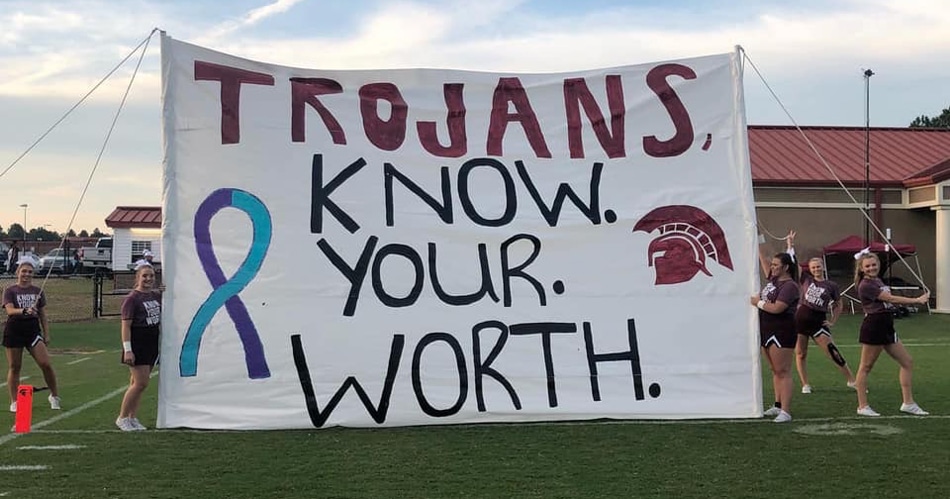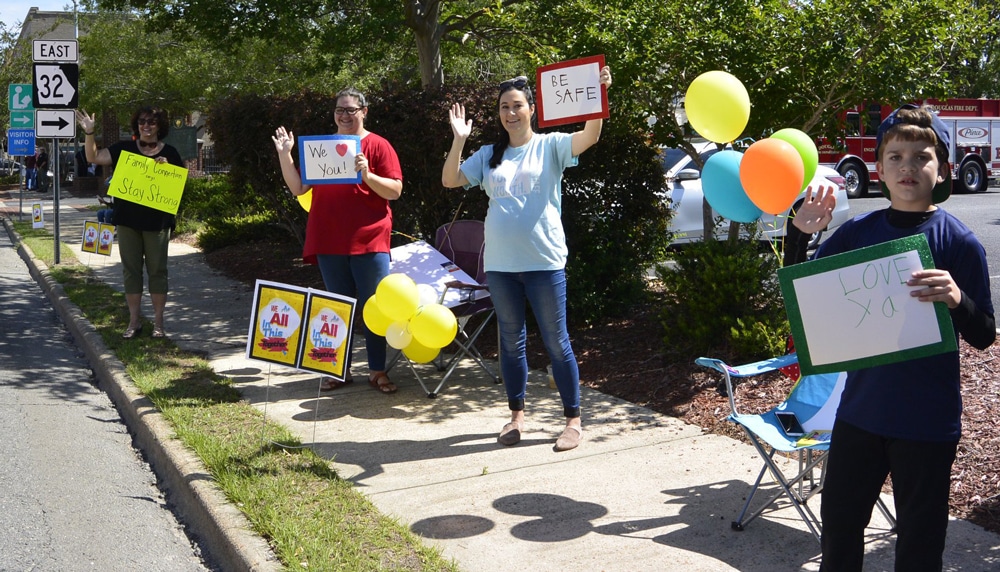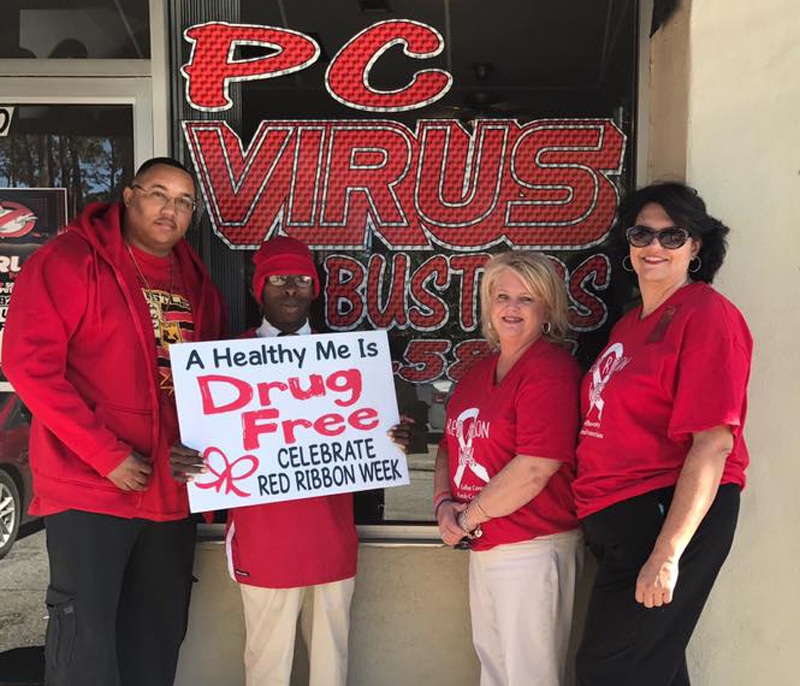Turning the Tide on Suicide and Substance Abuse in Coffee County
Print This Post
by Diana St. Lifer
Coffee County is all too familiar with the heartache a community endures when mental health challenges end in tragedy. Two high school students died by suicide from overdose in February 2019, followed by a cluster of suicide attempts within two weeks. It left a grieving community questioning how to prevent further tragedies.
“Our community was devastated,” said April Thomason, Coffee County Family Connection’s coordinator for the past 17 years. “We had an immediate issue we needed to address. I knew what I had to do from my experience with Family Connection, and that was to collaborate—to rally the community. We had to get everyone together.”
When Coffee County Schools Superintendent Dr. Morris Leis approached her for ideas, Thomason helped organize a “Community Conversation” to bring people together for open dialogue and brainstorming. Representatives from EMT, the school system, mental health partners, parents, the faith community, and others filled the room.
“Bob Powell, a local pastor, shared a concept he learned called CHAMP (Courage, Help, Adaptability, Motivation, and Perseverance),” said Thomason. “And another pastor suggested that sometimes people simply need a reminder to know their worth.”
That’s what prompted the Collaborative to print T-shirts with the slogan, “Know Your Worth,” which community members purchased and wore. “The message spread like wildfire,” said Thomason.

More than 2,000 shirts were sold in the first year alone, with funds supporting student events, speakers, community youth rallies, leadership retreats for student ambassadors, and other Know Your Worth initiatives.
“It’s an amazing thing to see and be a part of an initiative that has brought so many people and organizations under one umbrella working toward a common goal,” said Powell. “The school system, mental health agencies, churches from all denominations, and people who have felt the pain of suicide came together to turn the tide on an issue that had brought such emotional heartache to so many.”
Responsible Choices Boost Self Esteem
The Know Your Worth nonprofit’s initial goal was suicide prevention. However, it has since been expanded through Family Connection’s annual strategic plan to encompass decreasing risky behavior, boosting self-esteem, and making responsible choices. Plans are underway to develop a curriculum geared toward three pillars: schools, churches, and the community.
“These pillars can facilitate conversations about self-worth, organize events, and take steps to create and provide information about mental health resources,” said Thomason. “Each pillar also will have access to specific tools and resources for its area of services. For example, sermon outlines will be provided within the faith-based pillar.”

While the Know Your Worth initiative addresses a specific concern, a community needs assessment conducted in fall 2019 and winter 2020 uncovered another.
“The issue of substance abuse slapped us in the face,” said Thomason. “We had been working on substance abuse on the surface, but the community needs assessment results opened our eyes. The community overwhelmingly said we need to work on substance abuse prevention, so we’re digging deeper. We heard the community loud and clear.”
Survey results revealed that nearly 60% of 470 respondents think adult substance abuse with opioids is the largest issue facing Coffee County, followed closely by underage drug use. Lack of parent involvement, youth vaping, and adult alcohol abuse were also identified as widespread problems in the county.
Getting in Tune with Our Children’s Mental Health
The community needs assessment included a stakeholder interview with Leis and, for the first time, focus groups. Meeting with three groups—adult repeat substance abuse offenders, middle-school students, and high-school students—allowed the Collaborative to ask questions and get clarification. “Those are things you can’t do with a written assessment,” said Thomason.
Results of the meetings revealed a concern regarding substance abuse by both youth and adults, lack of parent involvement, and the need for mental health counseling.

Counseling and social worker support is available and funded through the school system, which currently employs 17 counselors, three social workers, two school psychologists, two family service coordinators, and four case managers—all full time.
“All these employees are trained in crisis intervention procedures, and we work closely with community agencies to address our students’ additional mental health needs,” said Leis. “Coffee is no different than most rural counties in which youth are exposed to drug use by adults. This is a problem that communities across our country are grappling with.”
Students voiced interest in having mental health providers in the school, so Leis partnered with Unison Behavioral Health in Douglas. “We provide a confidential space for them to conduct sessions,” Leis explained, “and we communicate with Unison staff about relevant information regarding students they service.”
Thomason posited that poverty is one contributing factor for high substance abuse in Coffee County. According to the latest KIDS COUNT data, 28.3% of children are living in poverty and 38.3% of families with children had annual incomes less than 150% of the federal poverty threshold—which is 9% and 10% higher than Georgia’s average, respectively.
“The ‘substance abuse rate’ is a general term,” Thomason explained. “Most of the data are broken down by specific drugs or even death rates. In our annual plan, we’ll use KIDS COUNT indicators and the Georgia Student Health Survey, which is based on student perception.”
The community needs assessment pointed to a lack of support services for children who live in families with substance abuse. The Collaborative’s prevention educator and registered nurse Courtney Sheffield said students often grow up in households with addiction.
“When I talk about addiction—whether it’s drugs, alcohol, or tobacco—I ask, ‘Is there anyone in your life who you care about who has some form of addiction to a substance?’” she said. “Nearly every time, the entire class raises their hands.”
Leis said children who are living with addicts or parents in recovery need a home where they can feel cared for and safe—and that the issue is multi-generational.
“If a kid’s grandmother or great-grandmother is smoking with them, how are you going to convince children they shouldn’t smoke? Before you know it, those students with a generational history will pull in other students who don’t have a generational history,” said Leis. “The school needs to know about their situation so we can have a counselor checking in on them and so that the teacher knows why these kids come in upset.”
Sheffield noted that part of her role is keeping up with trends about the drugs that are permeating the community. She recently discovered that fentanyl, a powerful opioid used as a pain medication, is prevalent in Coffee County.
“It made its way into the Atlanta area and is heading into the smaller, rural communities,” said Sheffield, who learned at a recent training class that individuals often travel to smaller cities to purchase drugs—particularly since the pandemic. “Think how easy it is for people in our community to get their hands on drugs if we are the place of access.”
The CDC noted in a 2022 report that suicide prevention will be critical as the nation continues to respond to the COVID-19 pandemic and its long-term effects on isolation, stress, economic insecurity, and worsening substance use, mental health, and well-being.

“I would love to see all substance abuse in our community eradicated,” said Powell. “But I realize that’s too broad of a target to begin with. If we can reach children and turn the tide of them never beginning a life of any drug use, then over time, substance abuse in our county will recede.”
To decrease youth risky behavior, Coffee County Family Connection plans to expand the popular Teen Maze program, an interactive event that allows students to experience the consequences of behavior and life choices. The Collaborative plans to add a refresher course for 10th graders, create a committee focused on alcohol and tobacco use, and gather input from experts to form a comprehensive plan focused on substance abuse.
A community-wide approach is crucial. “We’ll need to take a systematic approach to initiate systemic change,” said Dr. Leis.
Thomason is up for the challenge. “We’ve worked on countless issues over the years through Family Connection,” she said. “Each one is important—but this comes down to life or death. It’s probably the most important work we’ll ever do.”
To learn more about Coffee County Family Connection and the county’s community-wide approach to improve the lives of their children and families, contact April Thomason at april.thomason@coffee.k12.ga.us
Read and share Expanding Our Perspective, Unlocking Our Potential—Georgia Family Connection’s 30-year impact report.
Contact:
Bill Valladares
GaFCP Communications Director
404-739-0043
william@gafcp.org
Follow us on Twitter: @gafcpnews
Connect with us on Facebook.
